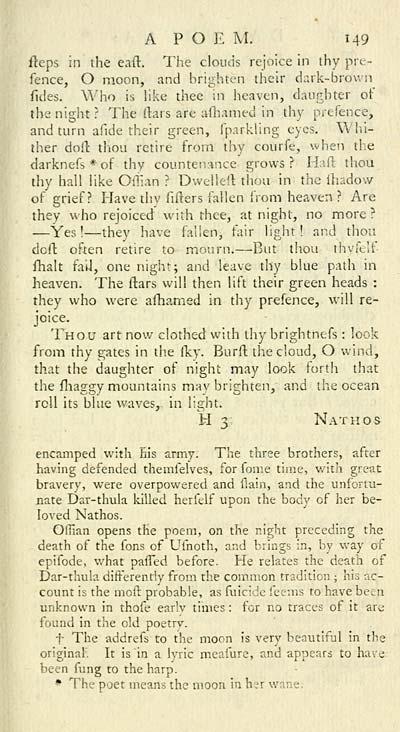Ossian Collection > Fingal
(189)
Download files
Complete book:
Individual page:
Thumbnail gallery: Grid view | List view

A P O E M. 149
lleps in the eaft. The clouds rejoice in thy pn -
fence, O moon, and brighten their dark-brown
fides. Who is hke thee in heaven, daughter ot*
the night? The ftars are ailiamed in thy prefence,
and turn afide their green, fparkUng eyes. Whi-
ther dolt thou retire from thy courfe, wheti the
darknefs*of thy countenance grows? M:'.ft thou
thy hall like Oilian ? Dwelleil: thou in the Ihadovv
of grief? Have tliv fifiers fallen from heaven ? Are
they who rejoiced with thee, at night, no more ?
— Yes! — they have fallen, fair light! and thou
deft often retire to mourn. — But thou thvfeli-
fhalt fail, one night; and leave thy blue path in
heaven. The ftars will then lift their green heads :
they who were afhamed in thy prefence, will re-
joice.
Thou art now clothed with thy brightnefs : look
from thy gates in the i"ky. Burft the cloud, O wind,
that the daughter of night may look forth that
the fliaggy mountains may brighten, and the ocean
roll its blue waves,, in light.
H 3 Nathos
encamped with his army. The three brothers, after
having defended themfelves, for feme time, v/lth great
bravery, were overpowered and (lain, and the unfortu-
nate Dar-tlmla killed herfelf upon the body of her be-
loved Nathos.
OlTian opens the poem, on the night preceding the
death of the fons of Ufnoth, and brings in, by way of
epifode, what pafled before. He relates the death of
Dar-tluila differently from the comm.on tradition ; his ac-
count is the moii probable, as filicide feems to have been
unknown in thofe earlv times : for no traces of it are
found in the old poetrv.
t The addrefs to the moon is very beautlfjl in the
originah It is in a lyric meafurc, and appears to have
been fung to the harp.
* The poet means the moon in her wane.
lleps in the eaft. The clouds rejoice in thy pn -
fence, O moon, and brighten their dark-brown
fides. Who is hke thee in heaven, daughter ot*
the night? The ftars are ailiamed in thy prefence,
and turn afide their green, fparkUng eyes. Whi-
ther dolt thou retire from thy courfe, wheti the
darknefs*of thy countenance grows? M:'.ft thou
thy hall like Oilian ? Dwelleil: thou in the Ihadovv
of grief? Have tliv fifiers fallen from heaven ? Are
they who rejoiced with thee, at night, no more ?
— Yes! — they have fallen, fair light! and thou
deft often retire to mourn. — But thou thvfeli-
fhalt fail, one night; and leave thy blue path in
heaven. The ftars will then lift their green heads :
they who were afhamed in thy prefence, will re-
joice.
Thou art now clothed with thy brightnefs : look
from thy gates in the i"ky. Burft the cloud, O wind,
that the daughter of night may look forth that
the fliaggy mountains may brighten, and the ocean
roll its blue waves,, in light.
H 3 Nathos
encamped with his army. The three brothers, after
having defended themfelves, for feme time, v/lth great
bravery, were overpowered and (lain, and the unfortu-
nate Dar-tlmla killed herfelf upon the body of her be-
loved Nathos.
OlTian opens the poem, on the night preceding the
death of the fons of Ufnoth, and brings in, by way of
epifode, what pafled before. He relates the death of
Dar-tluila differently from the comm.on tradition ; his ac-
count is the moii probable, as filicide feems to have been
unknown in thofe earlv times : for no traces of it are
found in the old poetrv.
t The addrefs to the moon is very beautlfjl in the
originah It is in a lyric meafurc, and appears to have
been fung to the harp.
* The poet means the moon in her wane.
Set display mode to: Large image | Transcription
Images and transcriptions on this page, including medium image downloads, may be used under the Creative Commons Attribution 4.0 International Licence unless otherwise stated. ![]()
| Early Gaelic Book Collections > Ossian Collection > Fingal > (189) |
|---|
| Permanent URL | https://digital.nls.uk/79175919 |
|---|
| Description | Selected books from the Ossian Collection of 327 volumes, originally assembled by J. Norman Methven of Perth. Different editions and translations of James MacPherson's epic poem 'Ossian', some with a map of the 'Kingdom of Connor'. Also secondary material relating to Ossianic poetry and the Ossian controversy. |
|---|
| Description | Selected items from five 'Special and Named Printed Collections'. Includes books in Gaelic and other Celtic languages, works about the Gaels, their languages, literature, culture and history. |
|---|

